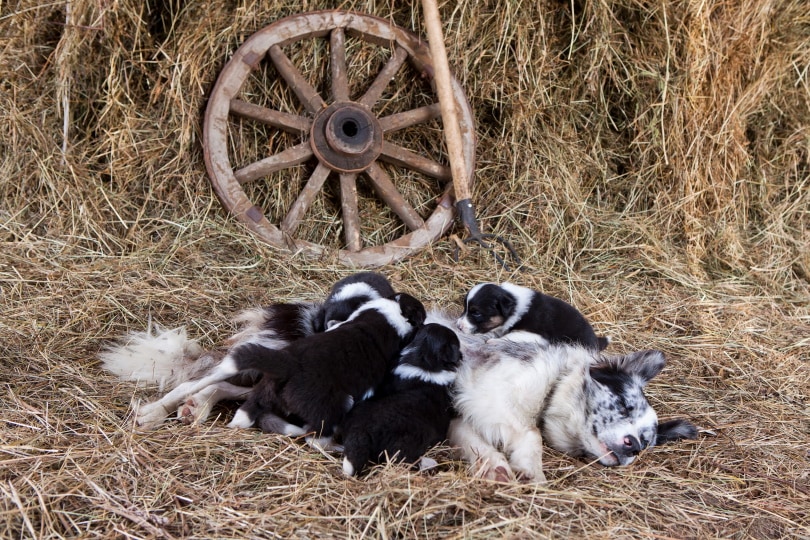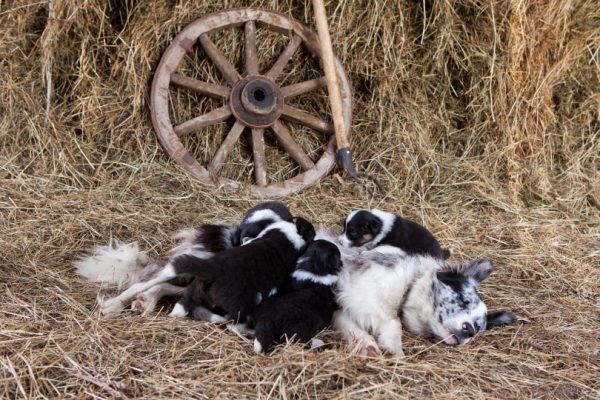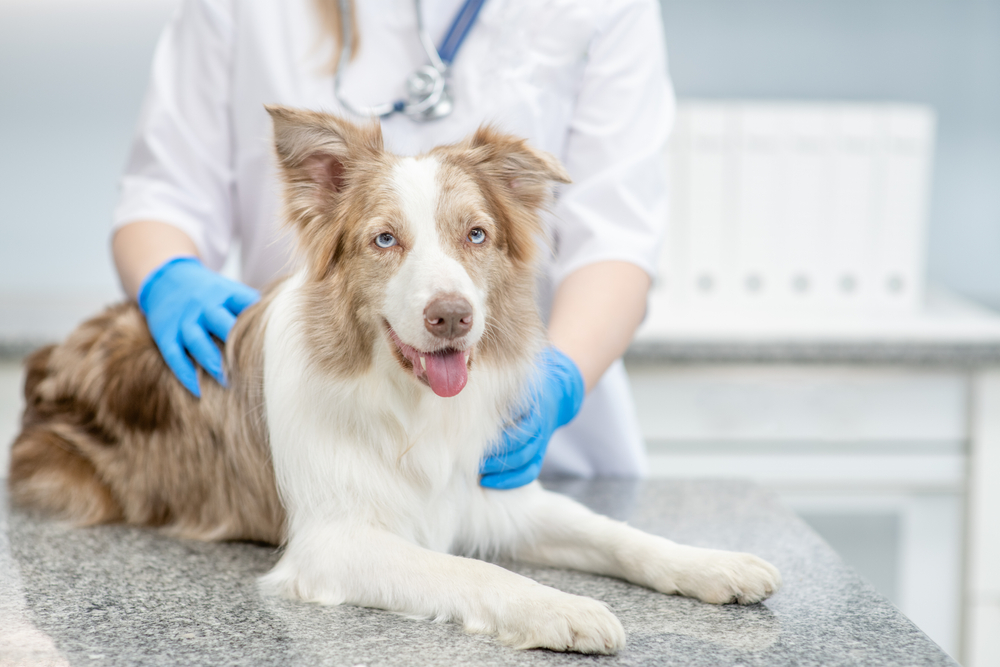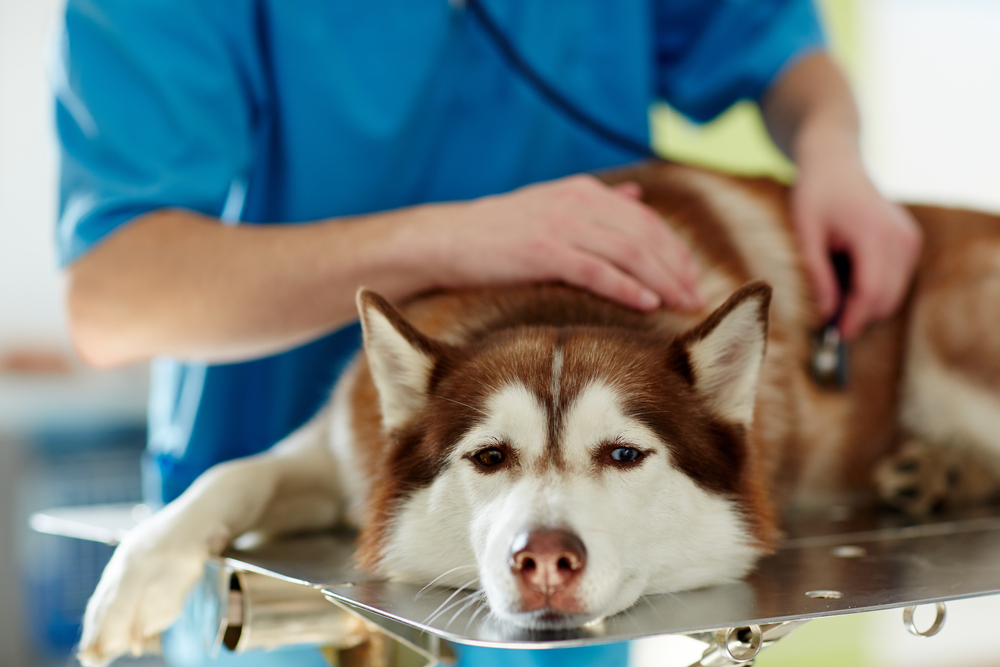Click to Skip Ahead
You may be full of questions if you have a pregnant Border Collie! Experienced Border breeders likely have all the information they need regarding a canine pregnancy, but it can be worrying for owners whose dogs are having their first litter.
Luckily, Border Collies have the same average gestation period and pregnancy milestones as all breeds, but there can be variations in nutritional and whelping needs. This guide will take you through your Border Collie’s entire pregnancy, from conception to the birth of the litter, including what to expect when they’re expecting and what to look out for if they need your help.
When They’re Expecting: What to Do When You Find Out
It’s best to get your Border Collie examined by your veterinarian when you suspect that she is pregnant. The vet will ensure your Border Collie is happy and healthy, though even the vet won’t be able to tell your dog is pregnant until they’re almost halfway through! A veterinarian can tell if your dog is pregnant in several ways, including ultrasound and blood hormone tests.
However, the most definitive method is an X-ray at around 55 days along. The advantage of an X-ray is that it can help determine the number of puppies that she is expecting.
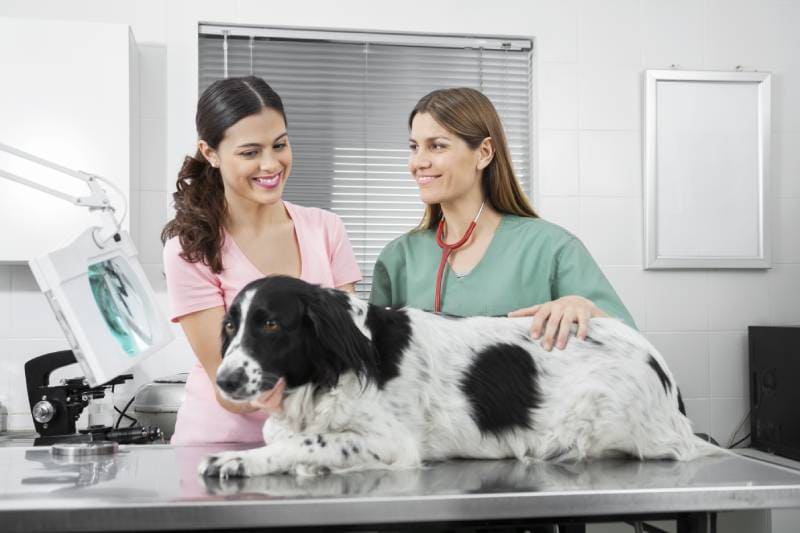
Preparing for Pregnancy
If you’re planning a litter of puppies or think your Border Collie is pregnant, you need to get everything your dog and her puppies will need ready for the birth. Raising puppies is a large task and should not be undertaken lightly. Growing, birthing, and nursing puppies put an enormous strain on a female dog’s body, and it is time-consuming and expensive for her owners. But with a little planning and lots of tender loving care, you’ll have a litter of healthy, happy, well-socialized puppies and a proud mom.
You’ll need to change your Border Collie’s diet from around the 5th week of pregnancy, ideally to a diet rich in high-quality protein and healthy fats, including omega-3 fatty acids. However, ask your vet about the best formulation for your pregnant dog. You’ll likely have to increase portions since your Border will need extra nutrition to grow and eventually feed her puppies.
Signs Your Border Collie Is Pregnant
If you’ve checked in with the veterinarian and considered what it takes to raise puppies, you can look for some signs that mating has succeeded. Assuming it’s successful, there will be tell-tale signs that your dog is carrying puppies that can show before you get your first vet test.
- Appetite decrease (first weeks)
- Tires easier
- Morning sickness
- Weight gain
- Increased appetite (later)
- Prominent nipples
- Irritability
- Increased affection
- Swelling abdomen (especially in the later stages)
Is your dog presenting any of these signs? We suggest you speak with a vet online.
If you need to speak with a vet but can’t get to one, head over to PangoVet. It’s an online service where you can talk to a vet online and get the personalized advice you need for your pet — all at an affordable price!

In the first few weeks, signs similar to morning sickness can occur. Vomiting can occur due to hormonal changes, but not all dogs experience it. If you’re concerned or if your dog vomits for more than a few days, make sure your vet checks her out.
Another thing to remember is that some of these signs could also indicate a false pregnancy. False pregnancy results from hormonal disorders causing changes similar to pregnancy but without fetuses developing. A vet visit is always recommended to rule out any other health problems and get advice on how to help your dog feel better.
Stages of Border Collie Pregnancy
The length of pregnancy and size of the litter can differ by breed, but your Border Collie will be pregnant for around 57 to 65 days. However, working out the expected due date can be tricky due to how dogs ovulate and reproduce.
Just like in humans, the pregnancy in Border Collies is split into three stages (trimesters), and each has different milestones:
1. The First Stage: Month One
On the 7th day after mating, any fertilized eggs will travel down the uterine horns and embed into the wall to continue growing, usually around day 16. There, the tiny embryos will develop into identifiable fetuses at day 22, and they can be detected by ultrasound at your vet’s office between days 28 and 30.
The number of pups your Border Collie could have cannot be accurately determined at this stage, but the heartbeats can be heard. At this stage, your Border should show signs of pregnancy and physical signs such as nipple enlargement and abdominal growth can be seen.
Image Credit: 4924546, Pixabay
2. The Second Stage: Month Two
During this stage, the fetuses begin to grow rapidly. Significant development occurs during the first half of this month, including eyelid and toe formation by day 35. By day 50, your Border’s puppies will have grown their coats and have skeletons that are visible on an X-ray, which is why many veterinarians wait until this time to determine how many pups could be in a litter.
Knowing how many pups a mom might have is useful, as keeping track of the puppy and placental delivery can help highlight any birthing problems. During this month, your Border Collie will become more obviously pregnant and will experience some of the following:
- Increased appetite
- More weight gain (around 20% to 50% of normal body weight)
- Visible movement of the puppies in the abdomen
- Rounded abdomen that feels firm
- Behavioral changes
- Increased urination
3. The Third Stage: Month Three
Your Border Collie will be getting ready to whelp (give birth) her puppies at this stage. Puppies finish developing and will move down into a whelping position by day 58, which means more changes are on the horizon for your Border. The most noticeable changes you’ll see are that her waist suddenly becomes slimmer, and her belly changes shape as the puppies move down into the birth canal. She’ll lose interest in food around day 61.
As birth becomes imminent, there are signs to look out for so you can help her prepare. For example, your Border Collie will become restless and begin to nest as the beginning stage of labor begins, and she may shake or pant. These are signs that she is getting ready to birth her puppies, so you should make sure her whelping box is set up and have everything you need ready for the puppy’s arrival.
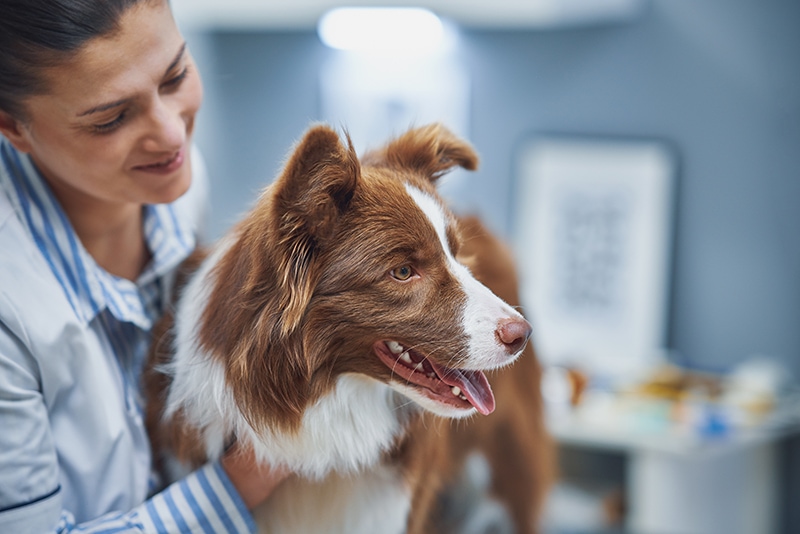
Week-by-Week Pregnancy Calendar
| First Stage: Weeks 1–3 | Second Stage: Weeks 4–6 | Third Stage: Weeks 7–9 |
| Week 1: Mating and ovulation begin, with sperm able to stay in the uterus for up to 7 days. | Week 4: The embryos grow, and the puppies take shape. Gentle palpation (feeling) by a vet can sometimes feel puppies at the end of this stage. | Week 7: The beginning of the last stage of pregnancy. Offer your Border Collie smaller meals regularly as she’s losing room to her growing pups. Ensure food is highly nutritious, such as puppy food. |
| Week 2: Embryos move down into the uterine horns and travel to the uterus to implant and begin development.
|
Week 5: Amniotic fluid is built up to protect the growing puppies, making it difficult to palpate them. Your Border Collie’s weight will increase noticeably, and ultrasounds can be performed at the end of this week. | Week 8: Labor is imminent at any time from now. Ensure your Border is comfortable with her whelping box, and be prepared. Movement of puppies can sometimes be seen through the abdomen at this stage. |
| Week 3: Embryos will have implanted into the uterus and are rapidly growing. Morning sickness or appetite changes can begin | Week 6: Pregnancy is obvious in Border Collies during this week, and she will begin preparing for birth. She will continue to grow and gain weight as pregnancy progresses. Changes to diet should happen around now. | Week 9: Birth will soon occur. Look out for signs of labor, including restlessness, panting, shaking, and nesting/digging. |
Whelping: Three Stages
Once your Border Collie has completed her pregnancy, the real fun begins! Whelping is a scary and painful experience for your dog; however, you can be on hand to comfort and reassure them, which goes a long way in helping them out. There are three stages to birthing in dogs, and each progresses one after the other.
Before whelping, you should gather all the materials and items you’ll need to ensure your Border Collie has the easiest birth possible, including:
- Whelping box
- Towels
- Newspaper/old sheets
- Notepad and clock for timings (not essential but useful)
A whelping box is the most important thing you’ll need for your Border Collie, as she’ll need a safe space for her and the pups to rest and feed. You should talk to your vet about what your dog may need, but a large, strong, open-top cardboard box with one of the sides cut out can be a good whelping box.
Fill the inside with newspaper and towels so you can keep it clean, and place it in an area that’s dark and warm.

1. Stage One
Stage one is not usually noticeable apart from behavioral changes and lasts 6 to 14 hours. Your Border Collie may become restless and might refuse to eat or vomit. She’ll likely begin nesting and digging at her whelping box and may pant or shake. Reassuring her during this period is important as she’s likely feeling some uterine contractions, which can be painful.
2. Stage Two
This is the stage in which puppies begin to be born. This stage can last 1 to 24 hours, and each puppy will be born one at a time. The birthing of each pup is usually 30 minutes to 1 hour long with a 1-hour gap, so it’s good to record times and numbers so you know how long it’s been and if any other puppies are expected. This can help you identify any sign of dystocia (problems giving birth).
If labor takes more than 24 hours or if more than 2 hours pass between having puppies, you should contact your vet and ask for their advice.
3. Stage Three
Each placenta is delivered after the puppy, but it happens during stage three. That means that each puppy has its own stage two and stage three, but labor and stage three are considered finished when the last placenta of the last puppy has been passed. Your Border Collie might eat the placenta; it is normal and natural, so you don’t need to worry.

Final Thoughts
Your Border Collie being pregnant can be a worrying but exciting time for you, and you can share in the journey with her by being prepared. Most dogs follow the same timeline and give birth around 57–65 days. You should always get your Border checked by a vet if you think she is pregnant; they can answer any questions and help you deal with the signs she exhibits.
Ultimately, ensuring your Border is comfortable and healthy will give her the best chance of whelping a happy and healthy pup. Staying in contact with your vet and knowing what to expect when she’s pregnant are the best ways to keep your Border Collie and her pups safe.
Featured Image Credit: Puhach Andrei, Shutterstock

